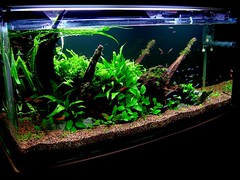This isn't a koi pond!!!
 I fished out this amount of food!! Twice!! I know at Suntec you can feed the fish food whenever you want but it doesn't work this way here! This isn't the first time I've discovered that someone else fed the fish. If I didn't happen to be there, all the excess food would have dissolved into the tank, caused accumulation of waste and disrupt the ecosystem of the tank. The fishes may have looked hungry, but they always act hungry. They will just keep eating and eating and eating! I've cut and pasted this excerpt from one of the websites so that EVERYONE will know why we shouldn't feed the fish unless authorised to do so:
I fished out this amount of food!! Twice!! I know at Suntec you can feed the fish food whenever you want but it doesn't work this way here! This isn't the first time I've discovered that someone else fed the fish. If I didn't happen to be there, all the excess food would have dissolved into the tank, caused accumulation of waste and disrupt the ecosystem of the tank. The fishes may have looked hungry, but they always act hungry. They will just keep eating and eating and eating! I've cut and pasted this excerpt from one of the websites so that EVERYONE will know why we shouldn't feed the fish unless authorised to do so: Problems associated with overfeeding
Accumulated uneaten food and fish waste pose a number of problems, as listed below. First, they can result in lethal changes in the water chemistry. The breakdown products are toxic and can stress fish, making them prone to other diseases. Overeating, itself, can cause health problems. Finally, the pond or tank can become very unsightly, not pleasing to the eye, or the fish.
High ammonia and nitrites - The protein in uneaten food and fish waste is broken down into ammonia and nitrites, which are extremely toxic to fish.
Low oxygen levels - When organic material (uneaten food and fish waste) decays, it is an aerobic process, meaning it uses oxygen and produces carbon dioxide. This means there is less dissolved oxygen in the tank or pond for the fish to use.
Low pH levels - Just as the breakdown of organic material lowers the oxygen level, it also lowers the pH of the water because acids are produced during the process. Since each species of fish has an optimal pH range, those fish that prefer an alkaline pH are especially stressed.
Fin rot - Fin rot is a condition in which the fins can develop a moth-eaten, shaggy appearance. It most often occurs when fish are stressed, which is a common result of overfeeding.
Fatty liver - Fatty liver, or hepatic lipidosis, is a disease more commonly seen in African cichlids and rainbowfish, and is the result of overeating. It affects the function of the liver and can result in death of the fish.
Improper digestion - In ponds, the amount and type of food must be changed as the weather becomes colder. Below 60°F, you should feed wheat-germ-based food exclusively to your koi, and since bacterial processes will gradually slow, the amount fed should be decreased. Below 50°F, the bacteria in a fish's digestive system are no longer able to process food and you should stop feeding altogether.
Algae bloom - Algae growth is one of the most common problems seen in ponds and aquariums. The number one cause is overfeeding. Unsightly blue-green and red algae multiply when there are large quantities of dissolved organic material, nitrates, and phosphates in the water, common occurrences when fish are overfed.
Cloudy water - Cloudy water in either a pond or tank is usually due to decaying organic matter. If due to overfeeding, the water will generally clear if the fish are not fed for 2-3 days (for most fish this is not a problem).
Mold - If the gravel, plants, and other décor have white, cottony material growing on them, the problem may be mold or fungus. As with algae, these organisms grow when there are increased levels of organic material in the water.
Planaria (flatworms) - Planaria are small white or tan worms that are good indicators that water quality is not optimal. They are most often found in tanks where overfeeding has occurred. Although generally considered harmless, they will eat fish eggs.
Clogged filters - Filter systems are designed to remove the normal amount of waste materials and breakdown products from the water, not correct the excessive problems that occur with overfeeding. Uneaten food and waste materials can collect on the filters, continue to produce toxic products, and clog the filters thereby reducing their capacity to function even more
So keep this in mind guys, and hands off the fish food! Don't make me check the security video tape!

